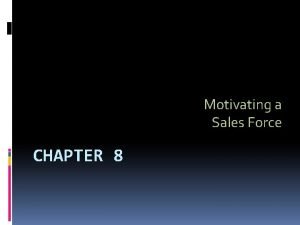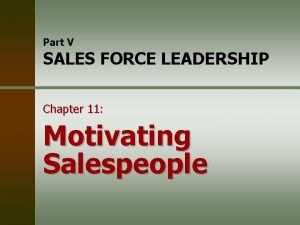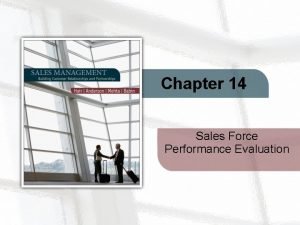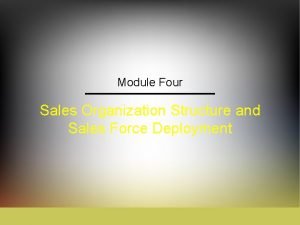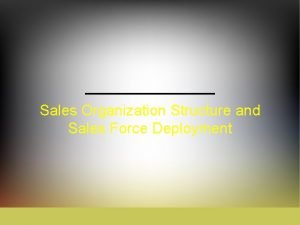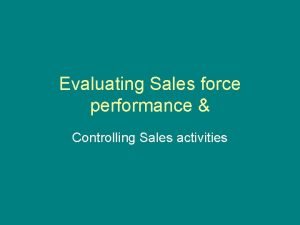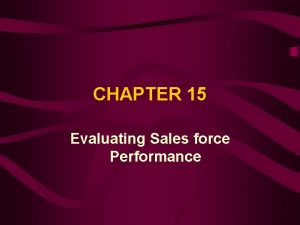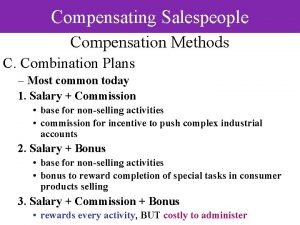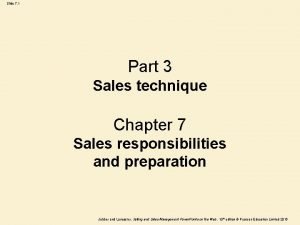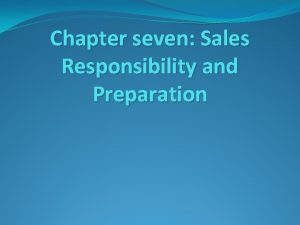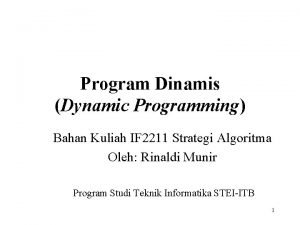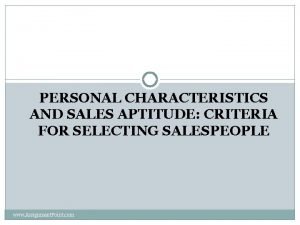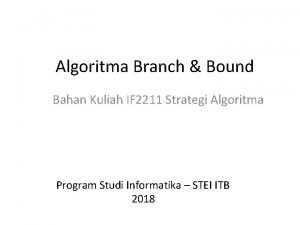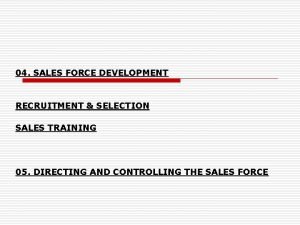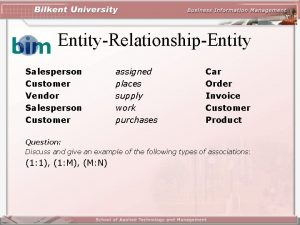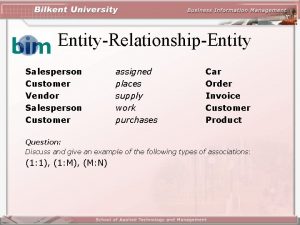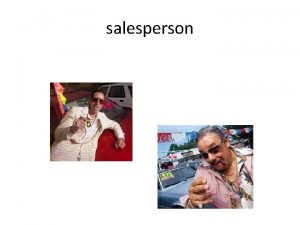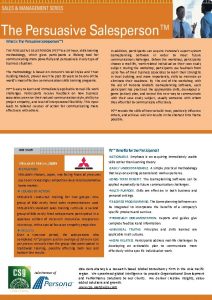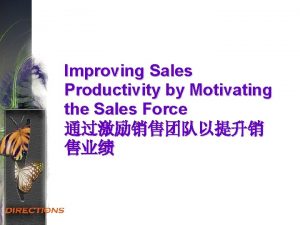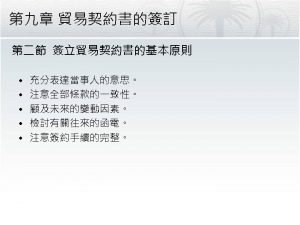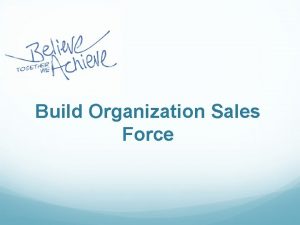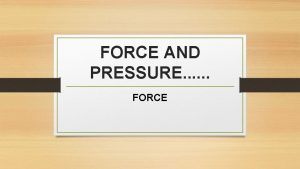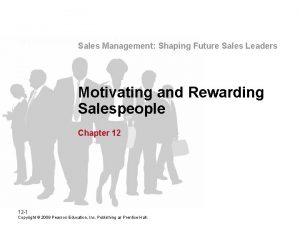Salesperson Performance in Motivating the Sales Force www















- Slides: 15

Salesperson Performance in Motivating the Sales Force www. Assignment. Point. com

SALESPEOPLE 1. Prefer novel, non-routine situations and • • • Like unique, and different situations and novel solutions, especially if seen as a break through. Tend to have a high tolerance for failure. Welcome the challenge of trying or creating a new or different approach. Enjoy field-testing a new solution or method by trial and error, make adjustments as necessary, and get momentum started while the idea or technology is still fresh and exciting. See the opportunities to be gained rather than the potential for loss. Management Tip: Encourage individuals to explore new challenges so that the salesperson does not feel like he or she is stuck in a rut or stuck in the same routine. Giving them freedom to try something different even though it may be risky or turn out to be a failure may keep them engaged. Continued…. . www. Assignment. Point. com

SALESPEOPLE 2. See meeting people as opportunities and • Prefer to ask questions of people who know rather than spend time reading a book. They like to surround themselves with people who they think are better at something than they are so they can ask questions of them. • Like opportunities to learn from people who have different opinions or perspectives to share. • Like opportunities to broaden their circle of acquaintances. • Seek out people to have conversations with. • Management Tip: Provide opportunities to meet and interact with new people that may not always blosom into a business relationship, but may have benefits in keeping a salesperson engaged. 3. Prefer a participative style and • • • Look for solutions that work for everyone involved. Favor meetings where everyone can participate. Management Tip: Involve salespeople and give them a voice. Decisions handed down without input are not likely to be followed, and may lower morale. www. Assignment. Point. com Continued…. .

SALESPEOPLE 4. Take pride in the depth of expertise acquired for their job. • Management Tip: Give them an opportunity to develop their expertise. Coaching, training, and professional development opportunities are likely to be appreciated. 5. Prefer to avoid or minimize confrontation and • Prefer to smooth over conflicts rather than choose a side. • Would rather keep opinions to themselves rather than risk alienating power holders. • Management Tip: Don't force salespeople to adopt one approach, rather, look for a "win-win" approach that leads to mutual satisfaction. You may get better compliance this way. 6. Enjoy sharing their expertise and • Find gratification in the success of those who benefit from their assistance. • Derive satisfaction from giving encouragement and support to others. • Seek opportunities to volunteer information, knowledge, and expertise. • Take pride in being a role model. • Like serving as a mentor and personal coach to those needing individual guidance. • Management Tip: Create opportunities for salespeople to experience how their expertise has benefitedwww. Assignment. Point. com customers.

THE PSYCHOLOGICAL PROCESS OR MOTIVATION Level of effort expended Job activity task (e. g. , developing sales presentations, calling o potential new accounts, servicing existing customers, etc. ) Level of performance on some performance dimension (e. g. , sales volume, new account sales, profitability of sales, etc. ) Increased attainment of reward(s) Intrinsic Expectancy Perceived linkage between increased effort on task and improved performance on some performance dimension Instrumentality Perceived relationship between improved performance on some dimension and attainment of increased rewards Valence for Reward Perceived desirability of receiving more of a particular reward The psychological determinants of motivation www. Assignment. Point. com Motivation Valence for performance Instrumentality multiplied by valence

Important questions and management implications of salespeople's expectancy estimates Question Management implications Accuracy of Expectancy Estimates Are salespeople's views of the linkage between activities and performance outcomes consistent with those of sales managers? Are there large variations in expectancy perceptions between high performers and low performers in the sales force? If substantial variation exists, salespeople may devote too much effort to activities considered unimportant by management, and vice versa. This might indicate a need for the following: More extensive/explicit sales training. Closer supervision. Evaluation of salesperson's effort and time allocation as well as performance. If high-performing salespeople hold reasonably consistent views concerning which activities are most important in producing good performance, those views might be used as a model for sales training/professional development programs. Magnitude of Expectancy Estimates - - All other things equal, the higher the salesperson's During periods of economic uncertainty, management expectancy estimates, the greater the individual's may have to change performance criteria, evaluation motivation to expend effort. methods, or compensation systems to maintain desired Do personal characteristics of salespeople influence the levels of effort from the sales force (e. g. , lower quotas, size of their expectancies? reward servicing rather than selling activities). Overall self-esteem? Perceived competence? Mental ability? (Intelligence? ) Previous sales experience? Do perceptions of uncertainty or constraints in the environment (e. g. , materials shortages, recession, etc. ) reduce salespeople's expectancy estimates? www. Assignment. Point. com

Factors influencing the motivation process Level of effort expended Job activity or task Level of performance on performance dimension Personal and organizational variables Role perceptions Company's compensation plan Role perceptions Expectancy Perceived effort/ performance probability Salesperson's Valence for Performance Instrumentality multiplied by valences for rewards Instrumentality Perceived performance/ reward probability Increase in attainment of reward (s) Internally mediated Externally mediated Personal and organizational variables Salesperson's job satisfaction Intrinsic Extrinsic Salesperson's Valence for Reward (s) www. Assignment. Point. com Motivation

Important questions and management implications of salespeople's instrumentality estimates Question Management Implications Accuracy of instrumentality Estimates Are salespeople's views of the linkage between performance on various dimensions and the rewards they will receive consistent with those of sales managers? - If substantial variation exists, salespeople may concentrate on aspects of performance considered relatively unimportant by management, and vice versa. This might indicate the need for the following: More extensive/explicit sales training. Closer supervision. More direct feedback to salespeople concerning how performance is evaluated and how rewards are determined. Magnitude of Instrumentality Estimates - - How are salespeople's instrumentality estimates influenced by their compensation system (salary versus commission)? Do salespeople on commission have higher instrumentality estimates for performance dimensions related to short-term sales volume? Do salaried salespeople have higher instrumentalities for performance dimensions not directly related to short term sales volume? If such relationships are found, managers should select the type of compensation plan that maximizes instrumentality estimates for those performance dimensions considered most crucial. Do personal characteristics of salespeople influence If such relationships are found, they may suggest the size of their instrumentality estimates? additional criteria for recruitment/selection. Feelings of internal control? Mental ability? Sales experience? www. Assignment. Point. com

THE IMPACT OF A SALESPERSON'S PERSONAL CHARACTERISTICS ON MOTIVATION Satisfaction Is it possible to pay a salesperson too much? After a salesperson reaches a certain satisfactory level of compensation, does he or she lose interest in working to obtain still more money? Does the attainment of nonfinancial rewards similarly affect the salesperson's desire to earn more of those rewards? The basic issues underlying these questions are whether a salesperson's satisfaction with current rewards has any impact on the desire for more of those rewards or on different kinds of rewards. The evidence is mixed concerning whether salespeople who are relatively satisfied with their lower-order rewards have significantly higher valences for higher-order rewards than those who are less satisfied, as theories would predict. Demographic Characteristics Demographic characteristics, such as age, family size, and education, also affect a salesperson's valence for rewards. At least part of the reason for this is that people with different characteristics tend to attain different levels of rewards and are therefore likely to have different levels of satisfaction with their current rewards. Although there is only limited empirical evidence regarding salespeople, some conclusions can be drawn from studies in other occupations. Generally, older, more experienced salespeople obtain higher levels of low-order rewards (e. g. , higher pay, a better territory) than newer members of the sales force. A salesperson's satisfaction with their current level of lower-order rewards may also be influenced by the demands and responsibilities he or she must satisfy with those rewards. Finally, individuals with more formal education are more likely to desire opportunities for personal growth, career advancement, and self-fulfillment than those with less education. Consequently, highly educated salespeople are likely to have higher valences for higher-order rewards. www. Assignment. Point. com Continued…. .

THE IMPACT OF A SALESPERSON'S PERSONAL CHARACTERISTICS ON MOTIVATION Job Experience As people gain experience on a job, they are likely to gain a clearer idea of how expending effort on particular tasks affects performance. Experienced salespeople are also more likely to understand how their superiors evaluate performance and how particular types of performance are rewarded in the company than their inexperienced counterparts. Consequently, a positive relationship is likely between the years a salesperson has spent on the job and the accuracy of his or her expectancy and instrumentality perceptions. Psychological Traits An individual's motivation also seems to be affected by psychological traits. The degree to which individuals believe they have internal control over the events in their lives or whether those events are determined by external forces beyond their control also affects their motivation. There is evidence that intelligence is positively related to feelings of internal control. Those with higher levels of intelligence-particularly, verbal intelligenceare more likely to understand their jobs and their companies' reward policies quickly and accurately. Thus, their instrumentality and expectancy estimates are likely to be more accurate. Finally, a worker's general feeling of self-esteem and perceived competence and ability to perform job activities (task-specific self-esteem) are both positively related to the magnitude of expectancy estimates. www. Assignment. Point. com Continued…. .

THE IMPACT OF A SALESPERSON'S PERSONAL CHARACTERISTICS ON MOTIVATION Performance Attributions People try to identify and understand the causes of major events and outcomes in their lives. These are called performance attributions. A given individual might attribute the cause of a particular event-such as good sales performance last quarter-to the following: 1. Stable internal factors that are unlikely to change much in the near future, such as personal skills and abilities. 2. Unstable internal factors that may vary from time to time, such as the amount of effort expended or mood at the time. 3. Stable external factors, such as the nature of the task or the competitive situation in a particular territory. 4. Unstable external factors that might change next time, such as assistance from an unusually aggressive advertising campaign or good luck. Management Implications The relationships between salespeople's personal characteristics and motivation has two broad implications for sales managers. First, people with certain characteristics are likely to understand their jobs and their companies' policies especially well. Second, and more important, some personal characteristics are related to the kinds of rewards salespeople value. www. Assignment. Point. com

CAREER STAGES AND SALESPERSON MOTIVATION Promoted to management Exploration stage Establishment stage Dropouts; terminations Maintenance stage Frustration; disenchantment Sales career path www. Assignment. Point. com Disengagement stage

Characteristics of different stages in salesperson's career Exploration Career concerns Developmenta l tasks Establishment Maintenance Disengagement Finding an appropriate occupational field Successfully establishing a career in a certain occupation Holding on to what has been achieved Reassessing career, with possible redirection Completing one's career Learning the skills required to do the job well Becoming a contributing member of an organization Using skills to produce results Adjusting to working with greater autonomy Developing creativity and innovativeness Developing broader view of work and organization Establishing a stronger self identity outside of work Maintaining a high performance level www. Assignment. Point. com Continued…. .

Characteristics of different stages in salesperson's career Exploration Personal challenges Must establish a good initial professional self-concept Establishment Maintenance Producing superior results on the job in order to be promoted Balancing the conflicting demands of career and family www. Assignment. Point. com Maintaining a high performance level Maintaining motivation though possible rewards have changed Facing concerns about aging and disappointmen t over what one has accomplished Maintaining motivation and productivity Disengagement Acceptance of career accomplishme nts Adjusting self-image Continued…. .

Characteristics of different stages in salesperson's career Exploration Establishment Maintenance Disengagement Psychosocial needs Support Peer acceptance Challenging position Achievement Esteem Autonomy Competition Reduced competitivene ss Security Helping younger colleagues Detachment from organization and organizational life Impact on motivation Low expectancy and instrumentalit y perceptions High valences for higherorder rewards, such as personal growth and recognition Supportive supervision is critical Highest Instrumentality expectancy and valence and for promotion instrumentalit fall Valences y perceptions for High valences recognition for pay, but and respect highest remain high valences for Highest promotion and valences for recognition increased pay Must avoid generating unrealistic expectation Lowest instrumentalit y perceptions and valences for both higher-order and lowerorder rewards Still desires respect, but that is unlikely to motivate additional effort www. Assignment. Point. com
 Sales force motivation ppt
Sales force motivation ppt Methods of sales force motivation
Methods of sales force motivation Sales performance appraisal
Sales performance appraisal Sales force structure example
Sales force structure example Sales department structure
Sales department structure Controlling the sales force is an activity of
Controlling the sales force is an activity of Evaluating sales force performance
Evaluating sales force performance Combination plan for salesperson
Combination plan for salesperson Responsibility of salesperson
Responsibility of salesperson Problem question sushil a salesperson
Problem question sushil a salesperson Sales responsibility
Sales responsibility Salesperson
Salesperson Salesperson
Salesperson Salesperson aptitude
Salesperson aptitude Salesperson
Salesperson Recruitment and selection of sales force
Recruitment and selection of sales force
